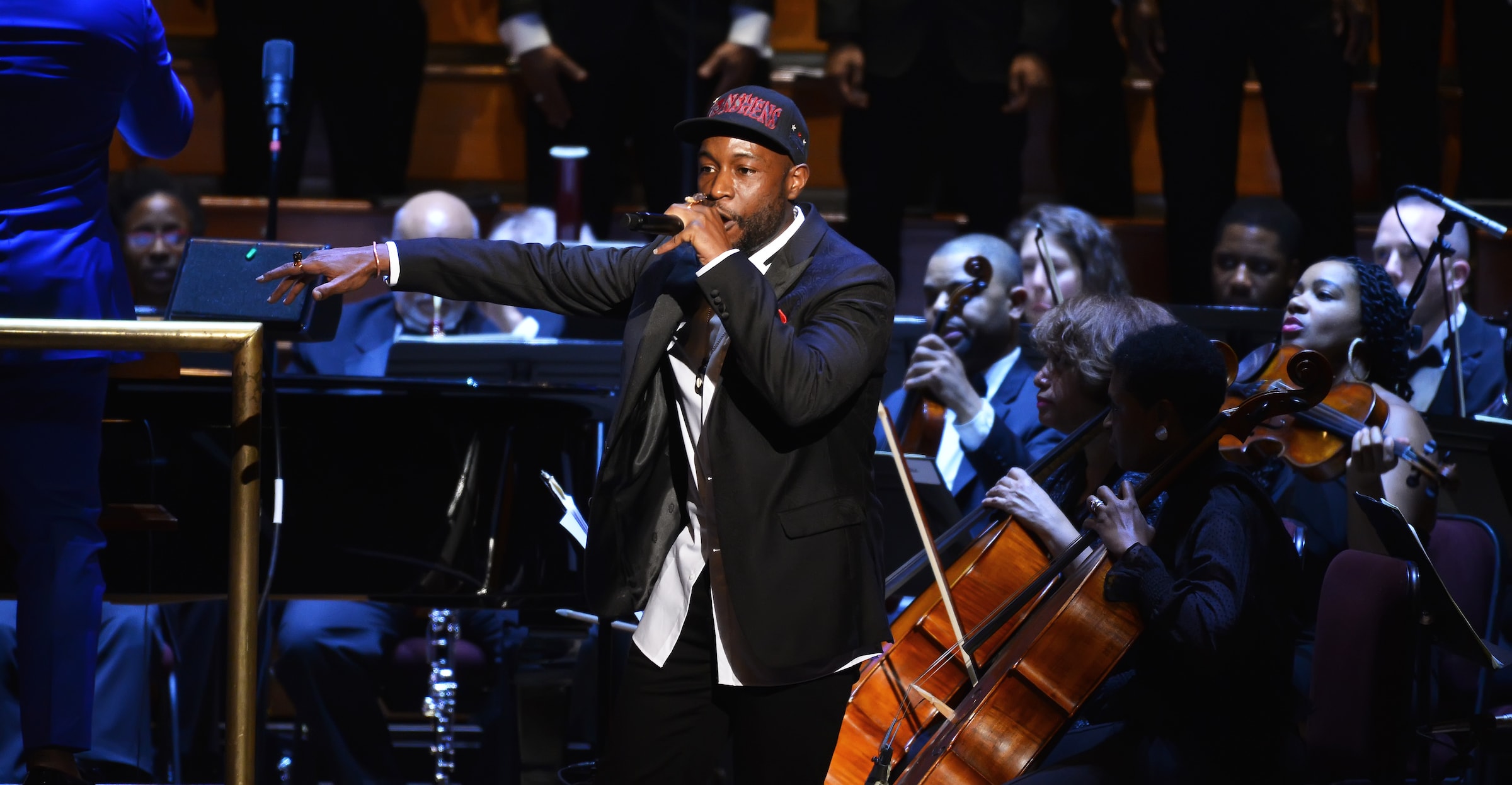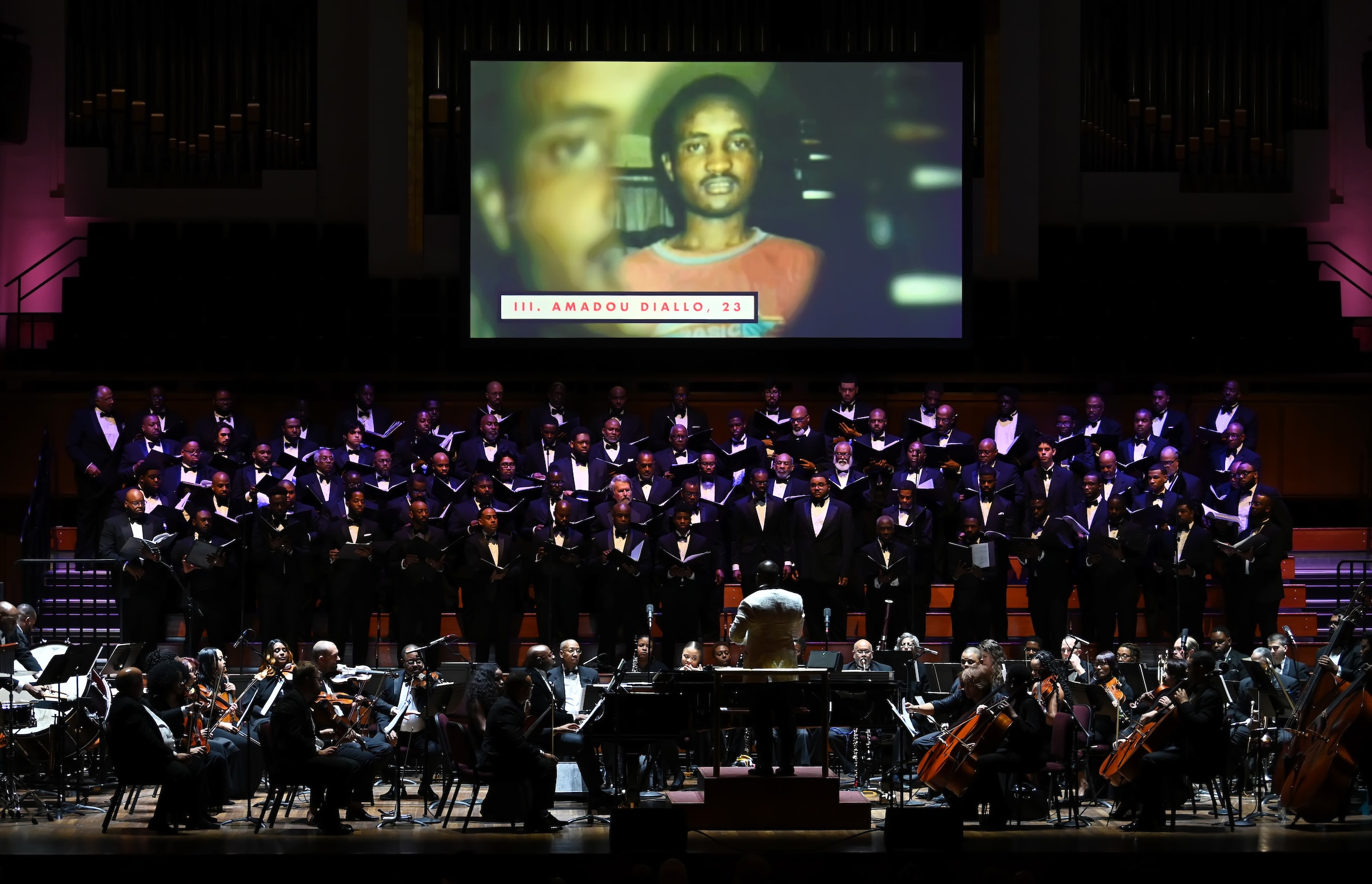A reverently curated evening by the Artistic Director of Washington Performing Arts’ Men and Women of the Gospel Choir, Theodore Thorpe III, I am a Man: Reclaiming Brilliance in the Midst of Brokenness at the Kennedy Center’s Concert Hall on March 1, 2020, was a one-night musical memorial to and celebration of the contributions of African American men past, present, and future. Co-presented by Washington Performing Arts (WPA) and Alfred Street Baptist Church, I am a Man was a gorgeous affirmation of the musical roots in the DC area as well as of the larger Black community. A tribute to the African American struggle, identity, power, and music, I am a Man reaches into the heart and awakens the song humming inside.

This theme of identity and strength was seeded even before the first chord sounded, with an opening sermon by Michael Eric Dyson. Highlighting the duality and friction of the African American story, Dyson set the stage for the unabashedly proud, bittersweet, and joyful celebration of black male identity at the core of I am a Man.
Opening the musical portion of the evening was Lift Every Voice and Sing with lyrics by James Weldon Johnson and music by J. Rosamond Johnson. Often heralded as the Black National Anthem, this arrangement by Roland M. Carter and David Morrow built voice on top of string, brass, woodwind, and percussion to create a wall of sound that saluted the evening’s purpose.
A sobering pivot to the past came next with Evolution of a People, Movement VI: Civil War to Civil Rights by Darin Atwater. This orchestral work — paired with a difficult and pressing slideshow by Ellis Marsalis — sat on your soul as it slowly moved from the horrors of slavery to the terrors of the Jim Crow South to the determined dignity of the Civil Rights era at the piece’s climax.
A climax that also set the stage for the evening’s emotional centerpiece, Seven Last Words of the Unarmed. This phenomenal and challenging work by Joel Thompson uses the last words of seven unarmed African American men who were violently killed and sets them to music as a way to humanize the men taken too soon. From the confusion of Movement I: Kenneth Chamberlin, 66 (“Officer, why do you have your guns out?”) and Movement V: Oscar Grant III, 22 (“You shot me! You shot me!”) to the concentrated youthful passion of Movement II: Trayvon Martin, 16 (“What are you following me for?”) and ethereal hope for the future of Movement III: Amadou Diallo, 23 (“Mom, I’m going to college”), each movement took the spark of life in each man and translated it into a compelling piece of music that instantly connected you to their spirit and grief in their loss.
This grief moved next to hopeful celebration in the final piece of the first half, Glory (from Selma) with music and lyrics by John Stephens, Lonnie Lynn, and Che Smith, arranged by Eugene Rogers. Featuring soloist Roderick Giles and hip hop artist, Konshens The MC, this piece was an emotional release after the intense charge of the previous pieces. The enduring and relentless faith of Glory amplified the buzzing energy in the audience to a jubilant high. Whether through shouts of encouragement, clapping along, or people rising to their feet, Glory perfectly showcased the unique power of black talent to motivate, unite, and celebrate.

Kicking off the second half, which centered on the many different voices, musical styles, and achievements of the African American performing artists, was the spoken word piece, I am Black. Performed by Mylik Cason and Jacob Fentress-Williams, this piece by Charnika Hayes (in the ministry at Alfred Street Baptist Church) examined black identity outside of skin color and highlighted the work still left to do in order to secure health, happiness, and equality. Charged with political energy in an election year, each emphatic declaration received a tremendous response of support from the audience.
Next — in contrast to the internal music and rhythm of the spoken word — were the classical music traditions of opera and piano. Renowned tenor Issachah Savage took the stage for Nein länger trag’ ich nicht…Durch die Wälder (from Der Freischütz), music by Carl Maria von Weber and libretto by Friedrich Kind. A distinguished talent in the classical music world with a poignant and powerful voice, Savage’s participation in such a DC community-driven event was as much a thrill as it was another beautiful celebration of black musical talent in all forms.
The same must also be said for pianist Joseph Joubert with his own arrangement of Variations on We Shall Overcome, the African American spiritual. While on the surface playing a very traditional collection of cadenzas and flourishes, his deft fingers flew across the keys to also interweave musical nods to his gospel roots. Each nod drew a fantastically strong reaction from the entranced audience and the choir seated behind him as all were fluent in the same musical language. Deeply engrossed in the sheer flurry of notes, those in attendance understood the underlying history of the melodic asides. This catalytic connection between music and audience was a perfect example of how an arts performance can give the audience as well as the performer a voice.
The final portion of the concert centered on two pieces that were exceptional examples of black style and swag, which also paired perfectly with Theodore Thorpe’s newly donned royal blue suit. Both by Darin Atwater, the first South Side: Symphonic Dances Movement VI, Promenade des Rois et des Reines Noirs, and Movement VIII, Him, Hem, Hymn, and second Paint Factory Movement V, Brown—Equality showcased the jazz component of the orchestra and brought out the pride in identifying as a black man. With Konshens The MC reappearing in Paint Factory, the pieces challenged the room to rise and be the change in the world by helping to lift those around you.
In closing the evening, there could be few stronger choices than bringing orchestra, choir, and soloist Issachah Savage together against once more for Make Them Hear You (from Ragtime). With music by Stephen Flaherty, lyrics by Lynn Ahrens, and arranged by Mark Hayes, this epic soundscape touched on the darker, sadder themes of the evening while also sending you out into the world with action and hope.
“Your sword could be a sermon / Or the power of the pen / Teach every child to raise his voice / And then my brothers, then / Will justice be demanded by ten million righteous men / Make them hear you”
A beautiful collaboration between WPA and the Alfred Street Baptist Church, I am a Man: Reclaiming Brilliance in the Midst of Brokenness was an evening I won’t soon forget. Through the phenomenal strength of music, sound, and emotion, I am a Man honors the African American community rooted in hope and courage. How incredibly fitting that an evening of music reaffirms identity, replenishes the spirit, and reminds us all that the future isn’t something that can be achieved alone.
Running Time: Two hours, with one 20-minute intermission.
I am a Man: Reclaiming Brilliance in the Midst of Brokenness played for one night only on March 1, 2020, at The Kennedy Center, 2700 F St NW, Washington, DC. For future performances at The Kennedy Center, call (202) 467-4600/(800) 444-1324, or go to the Kennedy Center’s calendar of events.




